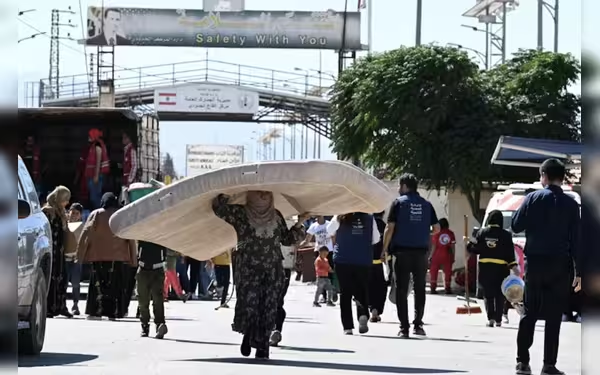Saturday, November 16, 2024 07:52 PM
Middle East Displacement Crisis: Humanitarian Catastrophe in Gaza
- Nearly 2 million Palestinians displaced in Gaza.
- Humanitarian crisis worsens amid ongoing conflict.
- International law violations by Egypt and Israel.
 Image Credits: asiatimes
Image Credits: asiatimesThe Middle East conflict has led to a humanitarian crisis, displacing millions in Gaza and raising international law concerns.
The ongoing conflict in the Middle East has reached a critical juncture, giving rise to a troubling new era of mass displacement. Over the past year, relentless fighting has not only escalated tensions but has also led to the uprooting of millions of people. As the threat of a direct confrontation between Iran and Israel looms larger, the humanitarian crisis in the region deepens, leaving countless individuals and families in dire circumstances.
In Gaza, the situation has become particularly dire. Nearly 2 million Palestinians have been forced to flee their homes due to Israel's continuous military operations. This staggering figure represents approximately 90% of the population in this densely populated area. What sets this crisis apart is the fact that most of these internally displaced persons find themselves trapped within Gaza. The ongoing border closures and relentless bombardment have rendered escape nearly impossible, leaving them to face a multitude of humanitarian challenges.
The consequences of this mass displacement are severe. The region is grappling with cascading humanitarian crises, including widespread famine and the rapid spread of diseases. Daily life has become a struggle for survival, as basic necessities such as food, shelter, and medical care are in short supply. The yearlong bombardment has led to repeated displacements for many families, as Israeli attacks shift unpredictably from one area to another, further complicating their already precarious situation.
International law experts have raised serious concerns regarding the actions of Egypt and Israel. They argue that by refusing to allow Palestinians in Gaza to cross the Rafah border to seek asylum, both countries are violating international refugee law. This situation is markedly different from previous displacement crises in the region, such as the civil war in Syria, where cross-border aid operations, despite their challenges, have been more accessible. In Gaza, however, Israel's restrictions on aid have made it exceedingly difficult for humanitarian workers to provide even the most basic support during ongoing bombing campaigns.
Moreover, the past year has revealed a grim reality: refugee camps, civilian apartment buildings, UN schools, and hospitals, which are supposed to be safe havens, have become targets in this conflict. The safety of civilians and refugees is increasingly compromised, leading to a growing sense of despair among the affected populations.
As we reflect on this tragic situation, it is crucial to recognize the long-term implications of such widespread displacement. The impact on the lives of millions will be felt for years to come, hindering their ability to live safe and secure lives. The international community must take urgent action to address these humanitarian crises and work towards a sustainable resolution that prioritizes the safety and dignity of all individuals affected by this conflict. Only through concerted efforts can we hope to alleviate the suffering and pave the way for a more peaceful future in the Middle East.













